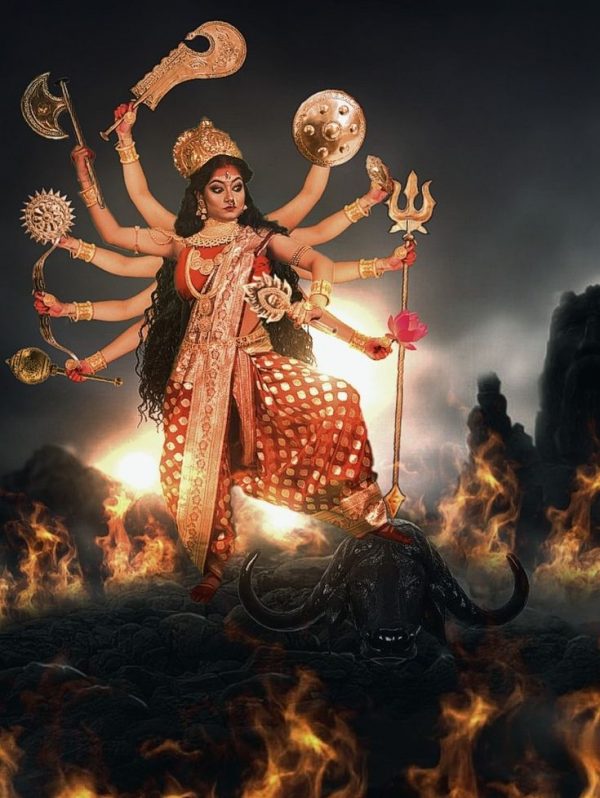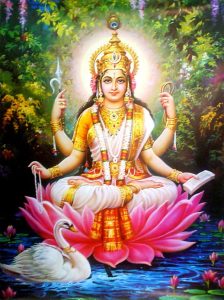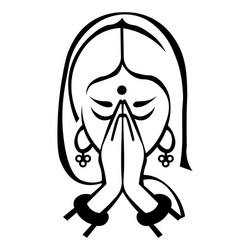In My Meditation Today: I was struck recently by how difficult it is to entirely welcome love into my life. There is always an inner conversation that questions motives and decides that the kind gesture or expression of love from almost anyone is expecting some reciprocation. It could not express love and admiration for me simply because I deserve it. This points to an emptiness that feels that I am not enough. The only way to fill that emptiness is to constantly affirm that I am an expression of the divine and as perfect a reflection of the source as a beautiful sunset or a moonlit sky.
The Grand Story of the Divine Mother is told in three parts.
Each part describes a battle between good and evil, and most often, the story is interpreted as the forces of good and bad external to us. However, a more helpful interpretation is that it represents the battle between my basest instincts and my highest potential.
The actions are bloody and gory because a struggle to live from your highest potential is brutal, ugly, and metaphorically bloody and gory.
We are at the last episode of the myth. Nishumbha has been killed, and the vast armies have been decimated. Shumbha is left to face Devi by himself.
Defiant in defeat, Shumbha yells, “O Durga, puffed up with misplaced pride in your strength of arms, don’t be so arrogant! It is by relying on the strength of others that you fight with this inflated sense of your importance!”
Durga responds, “I alone exist here in the world; what second, other than I, is there? O wicked one, behold these my manifestations of power entering back into me!” The seven shaktis that Devi had called forth reenter her body, and the Goddess says, “When I was established here in many forms, it was using my extraordinary power. I have withdrawn that. I stand utterly alone. May you be resolute in combat.”
![]()
The last terrible battle in the myth begins after these words of encouragement from Devi. Shumbha hurls many weapons at her, and she retaliates; she destroys his shield and sword and kills his horse; he rushes towards her and pounds her on the chest with his fist; she returns the blow, and he falls to the ground. He then jumps up, seizes Devi, and climbs “high into the sky.” The two battle there until Devi decides that it is time to end it. She throws him to the ground, and as he gets up and rushes towards her, she pierces his chest with her spear. He crashes to the ground causing the entire earth to tremble. Once he is dead, the ominous clouds that had gathered clear, the rivers begin to flow within their banks, and a sense of deep peace and calm envelops the world.
As I mentioned in the last post, Nishumbha represents attachment, and Shumbha represents our ego.
Dr. Wayne Dyers defined ego as “Edging God Out.” It is essentially our refusal to admit that we are perfect as we are. The edging God out, or EGO, results in a sense of emptiness inside, which we attempt to fill with everything except a feeling of being enough.
Shumbha and Nishumbha tried to fill the emptiness by conquering heaven and earth and collecting the best of everything. Despite this, when they heard about the Devi and her beauty, they had to have her because all that they had gathered for themselves still left them feeling empty; they had edged God out, and all the goods in the world could not fill the void caused by that edging out.
Their encounter with Devi is, in fact, their first step back into their divinity. They fight it with all they have because, as we have seen before, it is easier to live with a sense of unworthiness and lack than to acknowledge your greatness. Once you recognize your excellence, you must live up to it, which is unknown and scary territory.
It is important to note that none of these stories advocate poverty or suffering. So, the message is not a rant against the desire for material goods but an acknowledgment that possessions cannot / will not resolve the yearning that we feel inside to feel whole, good, and worthy. That only comes from the understanding that we are expressions of divinity, perfect just as we are in this moment and the next.
A couple more points to make. Devi blesses Shumbha. “Be resolute in battle,” she says before beginning her assault, just as she did before starting the final battle with Mahishasura earlier.
These are some of my favorite lines in this myth. Despite his wickedness which she acknowledges, she respects him and wishes him well in his misguided life, secure in the knowledge that she alone exists in the world and that he is, in fact, one with her.
The statement “I alone exist here in the world” is considered the “Mahavakya” – the great saying or essence of the Devi Mahatmya – the message – that all of us are expressions of that singular entity. The complete understanding and total acceptance of that message will allow you & me to let the love and kindness that comes our way into our unquestioning open hearts.
That dear readers, is my wish for you as we approach the end of this myth. May your heart open, and may you learn to acknowledge your perfection.

Set up a FREE call by clicking here, and let us talk about learning to welcome all forms of abundance, including compliments, love, and admiration, into your heart & life.
